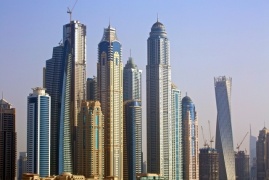
Last week research agency ValuStrat presented first detailed report on the changes in Dubai property prices. According to the agency, prices in the emirate’s residential market fell by only 10.3%, and not 15-20%, as predicted by many experts in the beginning of the year. Third quarter also showed a mere decline in prices — property prices in the "future city" decreased by only 0.9% during this period.
Based on data for 26 Dubai areas and residential communities, ValuStrat’s report suggests that at the beginning of 2016 Dubai real estate market will see a plateau in prices.
Other Dubai housing market analysts are even more optimistic forecasting that in 2016 the market may not only stop going down, but return to significant growth rates in the middle of the year.
Changes in pricing and in the ratio of the renting cost and the cost of the purchased property, which occurred in 2015, changed the market from inside. Today 8 of 10 Dubai residents are inclined to seriously consider home ownership, as shown by a survey from the compareitforme website, presented last week.
Most UAE banks, as noted in the other report by Stanton Chase, are ready to offer 1.6% mortgages. And the return on investment in Dubai’s real estate sector at the same time reaches 8% for ready property sector, and up to 58% for off-plan property, as estimated by Unitas Consultancy and JLL. The latter factor is taking into account rental income, which is by far higher than the average mortgage payments. However, even excluding this factor, the average return on investment for real estate in Dubai is currently one of the highest in the world. It stays at 7.5%, causing the constant increase of demand from foreign investors.
Despite the overall decrease in consumer activity in 2015 and a decrease in the number of transactions, statistics of interest in Dubai real estate from potential buyers, suggests the opposite. According to ValuStrat, apartment enquiry index in the third quarter rose to 50 points from 37.8 in the previous quarter, while villa enquiry index increased from 25.7 to 38.6 points.
Thus, we can conclude that 2015 was a turning point for Dubai real estate market, exposing its problem areas and finding ways to correct them. Market participants in 2015 just watched it taking another direction, that’s why many of them have chosen a wait and see strategy, reducing a statistical demand. However, in practice this means that the market has passed the stage of stabilization, adding confidence to the potential buyers and sellers.







